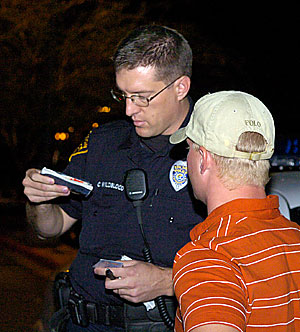 |
|
CHRIS CODUTO/Arizona Daily Wildcat
|
TPD Officer Chris Wildblood checks a suspected fake ID outside Maloney's Tavern Sept. 4. Possible penalties for the use of a fake ID include a six-month suspension of a person's drivers license.
|
|
|
By Holly Wells
Arizona Daily Wildcat
Monday, September 27, 2004
Print this
Police are joining forces with restaurants and bars in an effort to stop underage drinking.
Tucson Police Department Lt. Ruben Nunez said police can't have an officer at every single bar every single night so police are training bar owners and servers how to identify fake IDs and how to confiscate them.
Rob LaMaster, regional vice president of the Arizona Restaurant and Hospitality Association, said it is sometimes hard for bar and restaurant employees to spot a fake ID.
"Some of them are very, very good, and people pay a lot of money to get them," he said.
LaMaster said businesses have several tools they use to catch fake IDs including software that is downloaded on credit card machines, log books and even video systems.
Nunez said police will not cite a bar or restaurant the first time they see underage drinkers inside.
Nunez said police would warn a restaurant one or two times.
"On the third we will come after you," he said. "If they have a history, they're not learning from their mistakes, and our purpose is to change their behavior."
LaMaster said if a business is cited with serving to someone who is underage, the owners could face fines between $5,000 and $10,000.
 |
We're not trying to eradicate liquor. Kids aren't going to stop drinking, but we're trying to teach people to be responsible.
- Lt. Ruben Nunez, TPD officer
|
 |
Depending on how serious the issue is, the business could also lose its liquor license and be shut down, he said.
Servers and bartenders who serve minors also face fines of up to $500, LaMaster said.
Nunez said in the near future police plan to follow up with charges on anyone who has had their ID confiscated by a bar or restaurant.
When someone is caught with a fake ID they are given a court date and their driver's license is automatically suspended for six months. Police said that most people don't go to the court date and instead enroll in a diversion program.
The diversion program, which costs over $100, will eliminate the citation from a person's record, but their license will still be suspended.
Nunez said police plan to start taking all of the IDs that have been confiscated at bars or restaurants, find out whose IDs they were and follow up with sanctions.
Nunez said the TPD and Arizona Restaurant and Hospitality Association are concentrating on the driver's license suspension in hopes of dissuading people from using fake IDs.
"We know that this has an impact," Nunez said. "It's a good tool to use; we want the students to know that they're taking a big chance."
LaMaster said he only recently found out about the law that suspends the license of the person using the fake ID.
LaMaster said many restaurant and bar employees didn't know about the law and thought it was new, although it has been on the books for several years.
LaMaster said some restaurants on Fourth Avenue put up signs warning people of the consequences of using a fake ID.
"Hey it's not a joke, its not to be taken lightly," he said. "It's a state law and there are penalties."
Nunez said he believes underage drinking is a problem because it leads to violence and other crimes.
Alex Freeland, aerospace engineering freshman, said it's unfair for police to think all underage drinking leads to violence.
"There's no way to prove that, and it's not true for everyone," she said.
Francisco Madril, pre-business freshman, said he thinks students often drink too much.
"They get out of hand and don't know when to stop," he said. "Their perception is not up to par, and they do dumb things."
Madril said he knows several people who have fake IDs and said he doesn't think the stricter enforcement will stop them from using the IDs.
"They'll keep trying, (the IDs) are forbidden so that just makes people want to use them more."
Nunez said even with the increased efforts of TPD, restaurants and bars, he still expects students to continue drinking.
"We're not trying to eradicate liquor," Nunez said. "Kids aren't going to stop drinking, but we're trying to teach people to be responsible."
